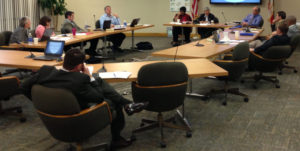
“I can tell you, Iâ€m shaking,†said Lowery, president of Amalgamated Transit Union Local 1395, “because I’m nervous how this vote will turn out.â€
Last fall, the Escambia County Commission passed the gas tax with the intent of using the revenue to fully fund the Escambia County Area Transit system. Officials with the city of Pensacola, however, have indicated they want to use the portion of the tax collected within city limits to fund economic development efforts at the Pensacola International Airport.
During yesterday’s Committee of the Whole—where council ultimately voted to dedicate the funds to ECAT—mass transit supporters made a vocal appearance. They urged the council to support mass transit, questioned using public funds to lure a private technology company in the hopes of creating jobs and, in short, were in attendance to “tell the mayor to go shove it.â€
“You’re not serving me, you’re not serving these people,†one lady said, referencing the public gallery. “I wouldn’t know what to do with a high-tech job.â€
Council President P.C. Wu asked the council to hold off on any action concerning the gas tax revenue until Mayor Ashton Hayward presented a proposal for the funds.
“In other words, there’s nothing there for you to talk for or against,†Wu said.
City Administrator Bill Reynolds told the council that the administration is currently in talks with the county. He said an agreement on the gas tax issue should come soon—“we feel that we’re very close in resolving it.â€
In a conversation with Interim County Administrator George Touart, Wu said he was told the city administration was looking to use $250,000 annually—of an estimated $700,000 to $800,000 the tax will generate in the city—to help fund efforts with the so-called ‘Project Stallion’ at the airport.
“Which he said—quote, unquote—they could live with,†Wu relayed, asking the council to wait. “Without a proposal on the table from the administration, it doesn’t make sense for me to move on this.â€
Reynolds said that when a tentative agreement had been hammered out, he would bring it before the council—“you’ll have an opportunity to review the facts at that point.â€
Council members, however, questioned the administration’s efforts. They also questioned who ultimately determined where the gas-tax revenues would go.
“The city council basically holds the pursestrings,†said Councilwoman Sherri Myers. “We decide where that 4-cent gas tax will go.â€
Councilman Charles Bare said that ‘Project Stallion,’ basically an attempt to lure Singapore-based ST Aerospace to the airport, wasn’t a sure-thing—“there’s a lot of competitionâ€â€”and suggested the city turn to the Economic Development Fund for any needed incentive-money. He also said he had spoken to Escambia County Commission Chairman Gene Valentino about the gas-tax and asked council to dedicate the funds to mass transit.
“He has all but begged for us to do this,†Bare said.
Other council members raised concerns over how the city administration has handled the gas-tax issue. Councilman Larry B. Johnson said he had needed to venture into the community “to try to piece together what’s going on,†and called the lack of information coming from the administration “a little frustrating.†Councilman Brian Spencer alluded to the resulting “gap in understanding.â€
Councilwoman Megan Pratt recalled a recent visit to Boston. She said she enjoyed the area’s mass transit system and visited with local companies—“they’re the high-tech companies we would love to haveâ€â€”where she was told a vibrant public transportation system was a key factor for businesses looking to relocate.
“I thought, ‘wow, wouldn’t that be great if we could have a public transit system that people wanted to relocate their companies for,’†Pratt said.
Reynolds told the council that the allocation of the city’s gas tax would be determined by an interlocal agreement with the county. He pressed for the council to hold off on voting on the matter until a proposal was before them.
“If this body wants to take a vote on a subject without knowing all the facts—that’s exactly what’s happening,†Reynolds said.
Councilman Charles Wingate asked how the city had anticipated funding ‘Project Stallion’ prior to the county levying the gas tax.
“If the gas tax hadn’t come up,†he asked, “we would have funded the airport, right?â€
Sensing the council’s leanings—“I’m old enough to countâ€â€”President Wu expressed his commitment to maintaining mass transit service at its current level, then made his final pitch for patience before calling for a vote. Council dedicated the anticipated gas-tax revenue to ECAT by an 8-1 vote.
“Boy, it’s lonely,†Wu said as an aside following the vote.